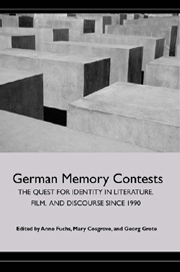Book contents
- Frontmatter
- Contents
- Acknowledgments
- Introduction: Germany's Memory Contests and the Management of the Past
- Positions
- Mediations
- Ethnicity/Hybridity
- Memory Politics
- 11 The Anxiety of German Influence: Affiliation, Rejection, and Jewish Identity in W. G. Sebald's Work
- 12 Between “Restauration” and “Nierentisch”: The 1950s in Ludwig Harig, F. C. Delius, and Thomas Hettche
- 13 On Forgetting and Remembering: The New Right since German Unification
- 14 A Heimat in Ruins and the Ruins as Heimat: W. G. Sebald's Luftkrieg und Literatur
- Works Cited
- Notes on the Editors and Contributors
- Index
12 - Between “Restauration” and “Nierentisch”: The 1950s in Ludwig Harig, F. C. Delius, and Thomas Hettche
from Memory Politics
Published online by Cambridge University Press: 05 February 2013
- Frontmatter
- Contents
- Acknowledgments
- Introduction: Germany's Memory Contests and the Management of the Past
- Positions
- Mediations
- Ethnicity/Hybridity
- Memory Politics
- 11 The Anxiety of German Influence: Affiliation, Rejection, and Jewish Identity in W. G. Sebald's Work
- 12 Between “Restauration” and “Nierentisch”: The 1950s in Ludwig Harig, F. C. Delius, and Thomas Hettche
- 13 On Forgetting and Remembering: The New Right since German Unification
- 14 A Heimat in Ruins and the Ruins as Heimat: W. G. Sebald's Luftkrieg und Literatur
- Works Cited
- Notes on the Editors and Contributors
- Index
Summary
In Wer mit den Wölfen heult, wird Wolf (Whoever Runs With the Pack Becomes a Wolf, 1996), his third autobiographical novel, Ludwig Harig repeatedly reflects upon the Zeitgeist defining the Federal Republic of Germany during the 1950s. His recurring preoccupation is the contradictory outline retrospectively presented by the era. “Zu keiner anderen Zeit lagen die großen und die kleinen Dinge weiter auseinander als Anfang der fünfziger Jahre” (at no other time were the important and the small matters further apart than at the start of the fifties), he writes:
Was ging's uns an, wenn in Korea die Kanonen wieder krachten, wenn zur gleichen Zeit Konrad Adenauer und François-Poncet […] zusammensaßen auf dem Weg nach Paris, den Vertrag zum Gemeinsamen Markt für Kohle und Stahl zu unterzeichnen! […] Wie wir Hermanns Plattenspieler unter der Dachschräge unserer Mansarde am zweckmäßigsten installieren könnten, war uns wichtiger.
[What did we care, if the guns blazed in Korea, if at the same time Adenauer and François-Poncet […] were en route to Paris to sign the treaty of the Community for Steel and Coal! […] More important to us was how properly to install Hermann's record player under the slanted attic roof.]
Setting a pragmatic Lebensgefühl against broader political developments, this passage illustrates a disjunction between the personal and the political, between life history and history that frames the diverse elements of the novel.
- Type
- Chapter
- Information
- German Memory ContestsThe Quest for Identity in Literature, Film, and Discourse since 1990, pp. 253 - 270Publisher: Boydell & BrewerPrint publication year: 2006



